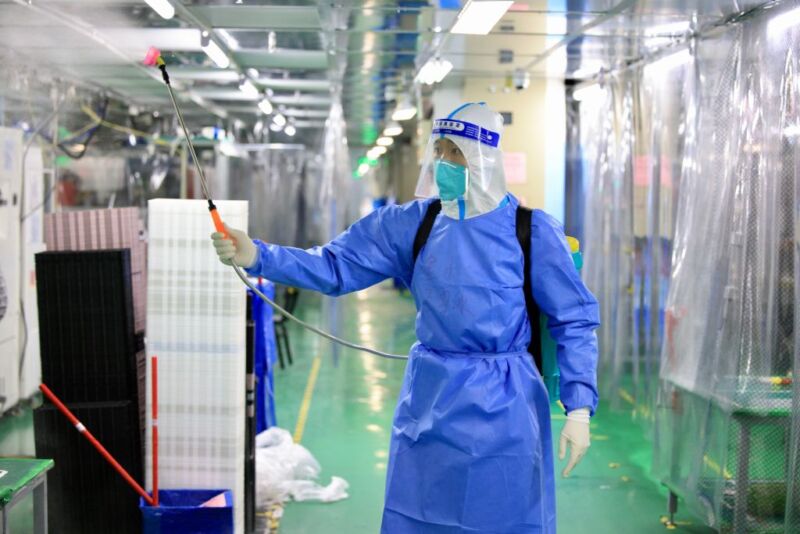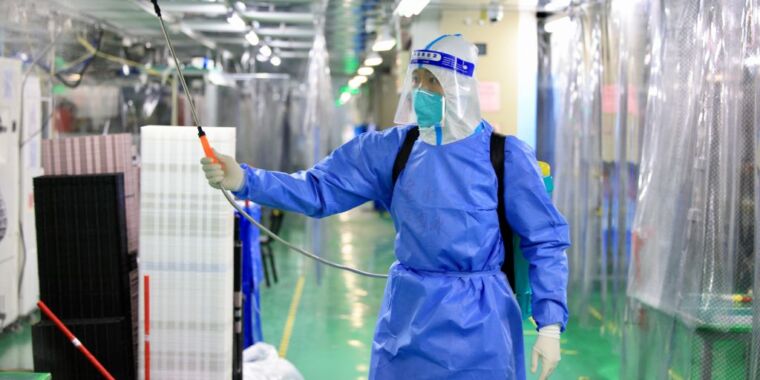
Apple’s business is threatened by a widespread coronavirus outbreak in China, with supply chain experts warning of a growing risk of months-long disruption to iPhone production.
The US tech giant has been dealing with more than a month of chaos at its main assembler Foxconn’s mega-factory in Zhengzhou, China, known as “iPhone City”, following a Covid-19 outbreak that began in October.
Foxconn has moved some of its production to other factories in China, while Apple worked with component suppliers to reduce unusually long wait times — about 23 days for customers buying high-end iPhones in the US, according to research from Swiss bank UBS .
With the Chinese government rolling back its zero-Covid policy, a longer-term risk now looms: the potential shortage of labor at parts or assembly plants across the country.
“We should see many operations impacted by absenteeism, not only in factories, but also in warehouse, distribution, logistics and transportation facilities,” said Bindiya Vakil, CEO of Resilinc, a California-based group that employs more than 3 million components for supply chain mapping.
Apple warned on Nov. 6 of “significant” disruptions leading up to the holiday season. The rare statement came less than two weeks after executives predicted moderate sales growth in the crucial period around Christmas, of less than 8 percent.
The consensus among analysts is that operating income this quarter will fall just short of the record $123.9 billion it achieved in the same period last year, with net income expected to fall more than 8 percent, according to bank estimates. collected by Visible Alpha. That would break through 14 quarters of revenue growth as Apple is short of between 5 million and 15 million iPhones.
Many analysts had initially forecast for the next six months, assuming that unfulfilled orders would be postponed rather than cancelled.
But risks to Apple’s 2023 earnings have increased as modeling has shown that 1 million Chinese are at risk of dying from Covid during the coming winter months after President Xi Jinping lifts strict pandemic controls. An Apple store in Beijing’s main shopping district was forced to cut hours last week because all staff were sick.
One-fifth of Apple’s revenue comes from sales in China, where more than 90 percent of iPhones are assembled there. Smartphone rival Samsung left China in 2019 and has diversified its assembly into at least four countries.
Horace Dediu, an independent analyst at Asymco, a consulting firm, said Apple’s manufacturing and operational problems in recent months could be followed by a demand crunch in China as consumers re-prioritize their spending habits.
“While the rest of the world saw demand increase during the lockdowns, it was thanks to working from home and stimulus measures,” said Dediu. “With low immunity and minimal safety nets, Chinese consumers could pull back and avoid big purchases next year.”
Apple’s major Taiwanese suppliers, including Foxconn, Pegatron and Wistron, have responded by trying to expand their burgeoning Indian operations.
Prabhu Ram, head of the industrial intelligence group at CyberMedia Research in Gurgaon, India, estimated that more than 7-8 percent of iPhones are assembled in India, and predicted that the three major Taiwanese suppliers are targeting 18 percent of iPhone assembly in India would take place by 2024.
China’s attempt to eradicate rather than contain the disease has exposed the country’s assembly lines, said Alan Day, chairman of State of Flux, a London-based supply chain consultancy that has worked with the UN on corporate standards for responding to Covid. outbreaks.
“The next two to six months will really be a defining moment for Apple’s supply chain, due to China’s immaturity in dealing with Covid,” said Day. “The rest of the world has developed standards, but China has almost failed to get companies to embrace those standards.”
Additional reporting by Ryan McMorrow in Beijing.
© 2022 The Financial Times Ltd. All rights reserved. May not be redistributed, copied or modified in any way.

